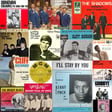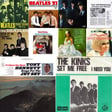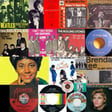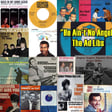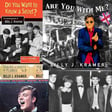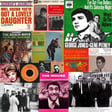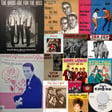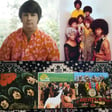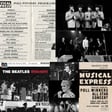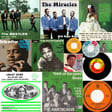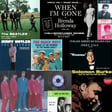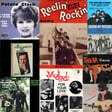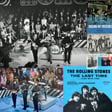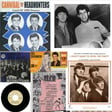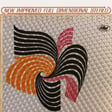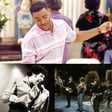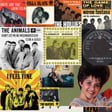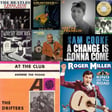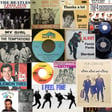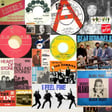Become a Creator today!Start creating today - Share your story with the world!
Start for free
00:00:00
00:00:01

January 1965 (side A)
1964 became 1965, but the Beatles had to deal with chasing the Abominable Snowman. Meanwhile, Brian and Cilla (and George Martin) chased The Righteous Brothers and Andrew Loog Oldham (and Phil Spector). We also see the new tunes from the band Decca chose over the Beatles, and the drummer who took up the sticks when Ringo chose the Beat;es over Rory Storm. Support this podcast at the $6/month level on patreon to get extra content! Create your podcast today! #madeonzencastr
Recommended
Transcript
Beatles' Morale and Podcast Introduction
00:00:00
Speaker
the Beatles had this chant John Paul and George and probably then Stuart and Pete had this chant when things weren't going well which in their world wasn't very often because mostly it was an upward trajectory but nonetheless sometimes you know a bad night or the gig would you know didn't work properly or the amps broke or whatever I say where are we going fellas and they'd go to the top Johnny and I say where's that fellas and they say to the top of most of the papa most I say right and we'd all sort of cheer up. Where are we going fellas? To the top! What top? To the very top! And this chant and John would say where are we going fellas and the others in an American accent and the others would say to the top Johnny get the exact wording right um where's that fellas to the topper most of the papa most Johnny
00:00:53
Speaker
And that was their rallying call. And when times were bad to kind of, yes, you know, we're still here. We're still together. A lot of irony in it as well. It was kind of done in a heavy American accent as a sender.
00:01:12
Speaker
Welcome to January, 1965. Side A, we're into a brand new year. I'm Ed Chin. I'm Kid O'Toole. And I'm Martin Quibbell. Happy new year, everybody. Happy new
Beatles' Christmas Shows (1963-1965)
00:01:25
Speaker
year. Although we don't know whether it's going to be January when you get this, but hopefully we'll get this out by the end of December. But yes, happy new year.
00:01:33
Speaker
Our feature this month, we're talking about something we've mentioned several times, but it's really kind of a cool thing. As we know, the Beatles did a residency both in 1963 going into 1964 and 1964 going into 1965. From the 24th of December to the 16th of January at the Odeon Hammersmith, the Beatles did another Beatles Christmas show.
00:02:02
Speaker
Another Beatles Christmas show. Such an original title. Not just that they reuse that on their Christmas record. yeah I'm sure Brian had already had the name by the time that they were planning this show because the second Beatles Christmas record, the 1964 Christmas record is identified as another Beatles Christmas record. Giving points for consistency.
00:02:27
Speaker
yeah I think it's more they didn't know whether by the end of the next year there would still be anything that anybody cared about for either another Christmas record or another Christmas show. and Maybe. So
George Harrison Meets Eric Clapton
00:02:40
Speaker
it's another one. so All right. This show is special because, well, this is really where George Harrison would first meet Eric Clapton. That's right. Starting a lifelong friendship. Good old clapper.
00:02:58
Speaker
so there You're doing a Christmas show now? Yeah. Really? Not at this minute, you know. I know, but I mean, if you're in the midst of one. Yeah. When is your holidays over there, from when to when? Uh, I don't know. Ask them for Christmas show, probably. You know, we'll get a few weeks off. I see. And, uh, is it going well? Yeah, it's gone great at the moment. Who else is in the show with you? Um... Lots of people, you know, I don't know whether you know a lot of them, but Freddy and the Dreamers? Yeah, well I saw most of them over at the, you know, in England. Yeah, sure, yeah, Freddy and the Dreamers, the Yardbirds, Fount Incorporated.
00:03:35
Speaker
day oh oh a lot yeah people We will go through some of the things that are in the show that we managed to find out. The Beatles were of course the headliners, some of the other acts, acts that we've talked about on this show any number of times. Freddie and the Dreamers, Sounds Incorporated, The Yardbirds, and then some other acts which well, I don't think we've mentioned quite yet.
00:04:02
Speaker
Elky Brooks, Michael Haslam, the Mike Cotton sound, and Ray Fell. I hope somebody picked him up. but Thank you very much. well And then Sounds Incorporated and The Compare, who, well, you probably don't want to mention, but we will. Good old Jimmy Saville. Saville. Mr. Saville. He deserves to have his name mispronounced, doesn't he? That's true. Good point. Yes. Yes,
Acts in Beatles' Christmas Show
00:04:29
Speaker
he does. He does. And since it's advertised as music, pantomime, sketches and comedy, which one of those do you think Freddie and the Dreamers works with?
00:04:41
Speaker
Because that could be any of those. Probably all of them. He's dancing his pantomime and comedy. Yeah, that's right. Sorry, I know there are Freddy and the Dreamer's fans out there. Particularly, I want to shout out my cousin Maureen. She was a big Freddy and the Dreamer's fan back in the day, and she's taken issue with my comments. I'm sorry, Maureen, I know you were a fan, but I'm sorry. Maureen, we want to see video of you reenacting the dance moves.
00:05:10
Speaker
Yes, I'd love that. I would love to see that. but We already have an announcer from an NET station, what would become a PBS station, introducing that video. That's something that still hasn't left my mind.
00:05:26
Speaker
but both the video and the introduction from that older fellow doing the Freddy. Oh my goodness. So yes, it did go all the way through mid-January, so it is still relevant for 60 years ago, but just barely. who So the Beatles did this show, or the Beatles and guests did this show twice every night, other than a handful of nights. The opening night and the 29th of December, they only did one show.
Paul McCartney's Holiday Activities
00:05:58
Speaker
and they were given the 25th and 27th and 3rd and 10th of January 1965 off. So Paul could go back home and play piano for his dad. ah They had to go to work on boxing there on the 26th. Apparently so. wow And then as mentioned the final show was the 16th of January 1965. Smart bang in the middle of this month.
00:06:25
Speaker
That's pretty grueling. So the opening act was the Mike Cotton sounds. We don't know who they are much, do we? No. I'm guessing there were groups that had Mike Cotton in them.
00:06:36
Speaker
Some of these acts were kind of lost to time. We got an article from one of the members of the Mike
Production and Performers in Beatles' Christmas Show
00:06:42
Speaker
Cotton Sounds talking about playing The Beatles Christmas Show and it's like, and we got special suits and we got Beatle boots and we all did our hair up like them. They really were trying to look like mid-63 Pierre Cardin suited Beatles. Well, I think a lot of bands were at that point. Obviously, they were so popular. Which is interesting because they're actually very jazzed, the band themselves.
00:07:07
Speaker
Hmm. Mike Cotton was only a trumpeter. We're going to talk about the Mike Cotton band here in a minute. We'll go through some of what's in that article. So the show opened with the Mike Cotton sounds performing the Georgie fame hit single. Yeah. Yeah. Which, well, we've talked about that, haven't we? Yes. Yep. Yeah, of course, that would be a mighty important song because as both Paul and Linda remember it, that was the song that was being played that evening when they met at the bag of nails. So Mike Haslam, who we will also talk about in a minute here, because I'll bet you don't remember who Mike Haslam is either. Some of you might. So the second song, we don't remember this song either, is a song called Scarlet Ribbons. No, I bet it was a banger.
00:07:54
Speaker
There was a bomb. Do you know the group that Mike Haslam's sister was in? I wasn't aware of that, but apparently they had more recognition than poor Michael Haslam did. No, or no i i know I don't know. What what band was that?
00:08:08
Speaker
We'll get to it. So the Mike Cotton Band, the first thing they tell us in this article from The Guardian, this wasn't the first time we'd shared a bill with the Beatles. A few years earlier, they were our warm-up band when we headlined the cavern in Liverpool. We really admired them. yeah Yet another act saying, the Beatles open for us. Wow.
00:08:31
Speaker
They opened for a lot of bands. Isn't that amazing? So the Mike Cotton sound does apparently go back to the early Cavern Club days, as Marv said, you know, the pre-rock and roll, pre-skiffle days of the Cavern Club. And that was probably not even the Beatles. It may have even been the Quarrymen that were opening for them. Not Johnny and the Moon Dogs. No, but it may have been J-Page 3. You never know. Yeah.
Beatles' Pantomime and Setlist
00:09:26
Speaker
So continuing talking about this show, it was produced by a friend of Brian Epstein. It was lavish with cascading waterfalls that flooded the stage. We started the night on a revolving podium and the leads kept getting tangled up. How could you have cascading waterfalls? I'm not quite sure. That's what I was thinking when I read that. Like, really? That sounds like Vegas. Like, really?
00:09:50
Speaker
And so the friend of Brian Epsines is a gentleman named Peter Yaland. If you look at the poster, it says that the show was devised and produced by Peter Yaland. Yes, I saw that. We're seeing now.
00:10:06
Speaker
I'm sorry, this is probably one of the few times that Brian allowed his homosexual side to overrule his good sense, maybe. who now So at the press call for the show, they noted that John Lennon knew all the photographers and journalists, and so yeah he called out to them. How'd he do Daily Express? How's it going Sunday time? So when they got up there, they decided to reflect their lowly status. What is it they said, Marv?
00:10:34
Speaker
Hello there, Williston Chronicle. Where is Williston? Do you have any idea? that
UK Charts and Beatles' Influence in 1965
00:10:40
Speaker
I have no clue. It's an area of Middlesex, northwest of vert Charing Cross Station. So there you go. It's kind of the same joke that Eric Idle would make in years to come about Rutland. Yes.
00:10:53
Speaker
So we got one more little bit of information about Mike Cotton and his band. After they appeared with the Beatles on another Beatles Christmas show, their keyboard player Dave Rowberry left to join the animals. Oh, interesting. And so they held auditions and Kit, you want to tell us some of the people that actually came to the auditions.
00:11:15
Speaker
Yep, fascinating. Said that we auditioned a lot of people to replace him, including Joe Cocker and Elton John, who we knew then as Reg.
00:11:27
Speaker
Of course, real name Reginald Dwight. We were an attractive proposition as we earned more than some bigger bands. Joe and Elton both failed their auditions. Not for musical reasons, of course. Joe didn't look right, poor Joe. And Elton was so shy and vulnerable he wouldn't have fitted in. He's probably grateful now. That kind of makes sense. He talked about how shy he was when he first started out. So that tracks that he probably was like that back in 64 or 65. But how fascinating Joe Cocker and Elton John auditioned. You know, I don't think I've ever actually seen Joe Cocker play keyboards.
00:12:07
Speaker
I was thinking the same thing. I actually didn't know he played keys. Well, I knew he played an instrument. I mean, he's not a guitar player and I figured he wasn't a drummer the way he moves around. So keyboards makes as much sense as anything. Yeah. All right. So the second act on the bill, Michael Haslam was actually an artist that was part of NEMS and Brian Epstein had found him. Okay.
00:12:31
Speaker
So, you know, everybody wonders about what's the first line of their obituary going to be. Well, we know in the case of Michael Haslam, ah Spencer Lee would actually write Mike's obituary. And it begins, not everybody that Brian Epstein managed became a star. And Michael Haslam was a sad casualty of his heavy workload. Sad because Haslam had genuine talent and deserved better. That's a sad way for your obituary to begin, you know?
00:13:00
Speaker
Dear me, that's like saying you could have been a star, but you weren't. Yeah. So Marv was asking about the Beatles tour of England, which preceded this Christmas show, the 1964 fall tour of England. Mary Wells was their second and beneath Mary Wells was Michael Haslam. So he had actually spent some time with the Beatles on tour. Okay.
00:13:24
Speaker
With regards to this show in particular, Haslam is quoted as saying, it was fabulous because it was the height of Beatlemania. We, meaning Michael and the Beatles, got on well together, although one night John Lennon pushed me too hard and I fell into the orchestra pit. Ooh! Ooh, dear. Wow, got some nasty injuries. That's actually quite a fall.
00:13:50
Speaker
Yeah, mhm. Michael Haslam would record two unsuccessful singles, Gotta Get a Hold of Myself, and as it says here, ironically, there goes The Forgotten Man, which is actually a tune by Burt Bacharach and Hal David.
00:14:06
Speaker
Wow. I don't know that song. Brian would get Haslam on Ready, Steady, Go and thank your lucky stars. So if you want to see Haslam, you can actually find those clips on YouTube.
Beatles' Influence on Musicians
00:14:18
Speaker
But the family feels that b Brian should have done more for the singer. However, eventually Brian just did not want the extra pressure and let Mike go. Unlike him letting go of the moody blues and then getting big,
00:14:34
Speaker
It didn't work the same way with Mike. Right. So Mike Haslam would go to his grave believing that Brian did not handle his career correctly and that Brian was responsible for slow ballads that sent the kids to sleep being assigned to him as material to record.
00:14:53
Speaker
Oh, geez. That's really sad. And so to answer your question, Marv, about his sister, who is actually the better known of the two siblings, his sister is Annie Haslam, who was the singer of the popular 1970s group Renaissance. And she also went on to have her own solo career. And my brother was opening up.
00:15:13
Speaker
for the Beatles. So we meet him outside the venue and he said, why don't you come back and meet the lads? And I said, oh, can I can't. I don't want to feel fuly about seeing a bit shame you know. I Anyway, my mum went in and my my dad said, I'll stay outside with him. He stayed outside with him. My mum went in and met all of them. You know, that was ridiculous.
00:15:39
Speaker
you In interviews with Annie Haslam, she says one of her regrets is that she never got to record anything with her brother, and she agrees that the brother was the more talented one of the duo. Wow. That's saying something, that is, because Renaissance were quite a band. I'm not familiar with them. I'll have to look them up. The show continued with the Yardbirds. We've heard of them. No, I've never heard of them. I'm just kidding.
00:16:08
Speaker
but Oh, yes, back to clapper. Yeah, back to Clapper. That's right. And we have told the story about how For Your Love was actually being offered to the Beatles. The Beatles didn't want it, and that was how the Yardbirds ended up with it. Brian was not willing to give them an audience with the Beatles, but he was at least willing to give them tickets to one of the Beatles Christmas shows. And, well, that was how the Yardbirds ended up with that song by 10CC's Graham Goldman.
00:16:37
Speaker
That song may have been offered to the group at the Christmas show. They went to Brian. Brian gave them tickets. And then when Brian wouldn't give them an audience with John and Paul, they apparently went and found the Yardbirds and said, okay, let's see if you guys want this song. I found an interview from 2021 with the Yardbirds drummer, Jim McCarty. And he talked about this happening at the show. He talked about how they had tried Finding commercial success he said we tried things like wish you would and good morning little schoolgirl and they weren't really commercial enough to get into the charts and Then we actually played with the Beatles. They used to have a Christmas show every year in 1964 we played with them at Hammersmith and a Christmas show and we were one of the support groups
00:17:24
Speaker
There was a publisher there and he had a demo of For Your Love, a Grand Goldman demo. He thought this group would be good on the song, so he got in touch with Giorgio and we all loved it. Of course, Clapton said, it's not really Blues.
00:17:40
Speaker
and We all know how we felt about that. So and yet another reason this was a significant show. If you read the opening of Ken Womack's book on George and Eric, he also describes the incident where George would first run across Eric sitting on an amp. Maybe that's why Yoko couldn't sit on an amp. George had memories of Eric sitting on an amp. No, no, no, no, no. We can't have that happen again. I didn't think of that.
00:18:10
Speaker
Yep, Georgia's PTSD. That's right. Now, for whatever reason, we don't have a set list for the Yardbirds, but Kit did find an album released right around this time, which is probably they played selections from this album.
Second Half of Beatles' Christmas Show
00:18:25
Speaker
Yes, did some research and after hitting some false leads and dead ends, finally found that just a few weeks before the show, the Yardbirds had released their live debut album called Five Live Yardbirds.
00:18:41
Speaker
yeah And I think it's safe to say, since this was their brand new album, that they probably played some cuts from this album. And the cuts on there were all covers. Too much monkey business. I Got Love If You Want It, Smokestack Lightning, Good Morning Little School Girl, which I just mentioned. Respectable. That was Nicely Brother's cover. Five Long Years, Pretty Girl, Louise, that's John Lee Hooker cover. I'm a man.
00:19:09
Speaker
And here it is. Now, one of the ones they might have played, as I'm looking at, might have been Smokestack Lightning. That was a big hit at the marquee. So it's possible they might have played that. I don't know. That was their most popular live number.
00:19:25
Speaker
I would also guess that they play Good Morning Little Schoolgirl. That was the single, so that's possible. So at most, they got two more songs, if that, as we're about to see. Freddie and the Dreamers only got three. Right. Too much monkey business, maybe? Although I could see John or Paul saying, don't do that. We might want to do that. Yeah, true. They did it too. That's right. Everybody get out there and buy the album, by the way. That is a banger of an album.
00:19:52
Speaker
I bet. And of course has Eric Clapton on it.
Beatles' Dislike for Pantomime
00:19:56
Speaker
And so once the Yardbirds left the stage, we finally get the Beatles back on the stage doing the pantomime. Which they just loved. Oh boy did they love. If you go and look at around the Beatles, this pantomime must have been 10 times worse than that. The previous year had had Ringo Starr playing Snow.
00:20:20
Speaker
You would run around the stage during the pantomime portion throwing snow on the other beetles. Nice. So for this year, and can you believe this is the end of 1964 into 1965? They're still doing this. The pantomime sketch had the Beatles dressed as Antarctic explorers searching for the abominable snowman. Oh, man.
00:20:44
Speaker
That's not promising. Doing this twice a night, I can just imagine by the second show, some nights, what John Lennon might have been saying, doing, or thinking. It's great, you know, it's good fun. There's lots of people all coming, which is nice. And we're having a good time, you know, with Freddie and the Dreamers and Yardbirds and everybody, it's good. Which do you prefer mostly, doing the sketches or doing your numbers? I think doing our numbers best. The sketches are lousy. Yeah.
00:21:14
Speaker
Yeah, the sketches this year aren't as good as last year's. But you know we didn't really have enough time to make it any better. But we prefer doing in our act now at the end.
00:21:25
Speaker
understandably because of their tight schedule in 64. So, you know, they didn't have a lot of time to rehearse or anything. But even he said it wasn't as good as last year's. It's sad that we don't have audio or video either of these shows.
UK Singles Chart Analysis
00:21:40
Speaker
I would so love to have a little bit more than what we do just to know what it felt like. There are photos from both shows available, but oh my, I can just imagine what this might have been like.
00:21:54
Speaker
Yeah. So yes, John Lennon didn't like it. And what Beatles Bible says is they reportedly grew to hate this section so much that they vowed never to undertake anything similar again. So now we know why there wasn't another another Beatles Christmas show. Yep.
00:22:11
Speaker
So not another Beatles Christmas show.
00:22:17
Speaker
Now, the one thing I will say is it's kind of ironic that Paul would go on to love hamming it up on Saturday Night Live so much because there's really not that much difference between, oh, say his wonderful Christmas time sketch on Saturday Night Live and something that they might have done in pantomime. Maybe you just got better over the years.
00:22:38
Speaker
and And so closing out the first half of the show was our old friends, Freddie and the Dreamers. Freddie's certainly doing the Freddie, although the songs they performed were Rip It Up, Batchelor Boy, and Cut Across Shorty. Yeah, I thought those were interesting choices, not their hugest hits.
00:23:00
Speaker
Yes, he's not telling them now. And so the second half was basically a Beatles show. They got a little bit of time off stage. Now we know where Ringo got the idea from. They went and changed and ah got a little cuppa or something. whether you call me on the hop just having a tea The second half was opened by Elky Brooks and a short set from Sounds incorporated. Our old buddies. Yes. Not sounds orchestral. No, no. And then Marv, you want to tell us, uh, what did the Beatles play in the 1964, 1965, another Beatles Christmas show? Are you playing the ones off your LP? What? Yes.
00:23:42
Speaker
and we people Yeah. Um, yeah, we're playing some off our LP and, uh, singles and things, you know, we just, and mucked in um the tunes that we think people would like to hear. So they opened with Twist and Shout. Crikey, that must have been a killer on Jon's voice. Yeah, wow. And then stayed with Jon to do I'm a Loser, Babies in Black. So after that you've got George's song ah Everybody's Trying to Be My Baby.
00:24:11
Speaker
ah Paul doing can't buy me love and then um the great ringo number honey don't the car Perkins cover before coming back with the absolute gem that is I feel fine so John again aren't single and they learn how to play the feedback intro by this point in time cool and then the B side to that to she's a woman so pull their john's back for a hard day's night.
00:24:38
Speaker
Rock and roll music. yeah guess yeah Wow. And then of course, finish off with long tour. Sally Paul doing his his best um little Richard impression. Folks, if that's not a killer set list, I don't know what is. Wow. I like it better than a lot of the sets that we were to get later on the 65 tour.
00:24:59
Speaker
i mean One thing that i that I find a little bit weird is Babies in Black, to be honest with you. Yeah. I mean, that's an interesting choice. I'll take it. I'd love to hear that live. I mean, those harmonies. Oh, wow. I wish they'd recorded an outlet. It was a live album. I was just thinking that. Oh my God. And they didn't record it.
00:25:18
Speaker
Oh, by the time we got babies in black on the 65 tour in the US and other places, they had basically given up the ghost on it. Kind of. It's not quite as bad as 66, but they were trying, but.
00:25:34
Speaker
a While the audience was loud, the venue was small enough that they could probably still hear themselves. Right. Exactly. All right, Kit, you want to read what Beatles Bible had to say about the final bit here on another Beatles Christmas show?
00:25:51
Speaker
Well, remember, Hammer Smithsonian was a big venue. So these shows were a hit and they were packed twice nightly for more than two weeks. And that really only the Beatles could do that. And they were full of traditional songs as well as their own hits. And as they put it, it doesn't get more Christmasy than this. And boy, I think I speak for all of us when we say we would have loved.
00:26:20
Speaker
to have been there. I mean, i and and at the very least, as I said, I wish this could have been recorded, even for the Beatles performance alone. I mean, that is just one of the best stuff lists you can get, at least from this period. Well, when you consider that the 63-64 Christmas shows total had over 100,000 people who saw it, this had more than that You know, there may well be an audience recording out there
Patreon Content and Future Plans
00:26:49
Speaker
somewhere. We just discovered the audience recording last year from the Stowe School. right It would not surprise me if someone were to go in their attic and, oh, what's this old tape? Yep. If it's out there, somebody come forward. This would be wonderful. I mean, not just the Beatles, too. When you hear the Yardbirds, Nets, that set would be great to listen to.
00:27:11
Speaker
Everybody go and search those attics, but make sure you don't get locked in up there like Clark Griswold. And then closing out on this, the most common artifact you're going to find is the program for this show. John Lennon designed both the front and the back covers with drawings very much in the John Lennon style. But he uses the bits of Holly rather than fig leaves to cover the modesty of his drawings. Yes.
00:27:40
Speaker
ah That made for a holly jolly Christmas. Yes. Yeah, I think the programs go for quite a bit of money. A couple hundred dollars. In fact, one could do an entire podcast on another Beatles Christmas show. So how would you be able to, you know, make a podcast about that? Quick, jump into the DeLorean, bring Kit along too. This involves her as well. Set the year to 2025. We're going back to the future. What?
00:28:10
Speaker
are
00:28:18
Speaker
Doc, does the drummer from the Beatles go to country or something? Well, my gal Brenda Lee will be joining Ringo Starr in a CBS TV special celebrating peace, love, and country music taped mid-January with an air date to be determined, but probably soon. While we're here,
00:28:38
Speaker
This bit of paper in front of me right now it says to thank our Patreons David Modlin and Kevin Lark and to let you know starting this month we will be doing extended versions of some shows with extra content for Patreon. Whoo! Well let's see if they'll fix things and now we will be returning to 1965. Oh good now I don't have to wonder what a podcast is anymore.
00:29:20
Speaker
And now we continue with the UK charts from January 1965. the week of December the 30th, 1964 through the 5th of January, 1965. At number one was that song, that song we were just talking about, I Feel Fine, which went from number one for two weeks to number two to number seven to number 13. Oh, that song. That song, that's right. Banger. Banger times 100.
00:29:55
Speaker
At number 35, a song which we talked a bit about a couple of months back when we were talking about the Backpage feature because, well, it was featured on the Backpage, the Blind Date feature that the Beatles did. At Mem by Francois Hardy. The song would go from 35 to 41 to 31 to 44. Now that we've heard the whole song, the production team could have maybe pulled back the Spectre just a little bit. However,
00:30:25
Speaker
It is a fun, enjoyable record. It is more than a little bit to do, Ron Ron. It's good, but not great. Yeah, I would definitely agree with that. I mean, it it's so definitely sounded Ronette-ish.
00:31:13
Speaker
Definitely a full spectre-like production. And you answered one of my questions because I kept thinking, why does this sound familiar? And now you answered why. As you said, the backing vocals are better than I remember. It's okay. yeah Francois Hardy had a ah nice bit of a sensual kind of voice, but is it something I would listen to repeatedly? No, probably not, but it's a decent record.
00:31:41
Speaker
Yeah, it's got melody. A voice is good. I'm not going to win awards for histrionics on vocals, but she gets point across and it's all about the laid-back sensuality, I think, of the song that they're trying to get across here. Yeah, it's okay. Would I go out my way to go and listen to it? No. And we got a very slight Beatles reference here. Marv, you want to read the title of this since it's in French? Je vous qu'il revienne.
00:32:08
Speaker
So that was on an EP that Francois Hardy released right about this same time. That song was a French cover of the Vernon Girls. They had a song called Only You Can Do It. The Vernon Girls. It's Vernon's Girls, by the way. Vernon's Girls, that's right. okay We haven't seen them in a while, so I forgot.
00:32:27
Speaker
The Vernon's Girls version of the song was written by Charles Blackwell. Charles Blackwell is better known as an arranger and an orchestrator. Blackwell notably takes credit for the orchestration on the song Please Release Me, a song we're familiar with. hu Please Release Me by Engelbert Humperdink would stop the Beatles roll and neither Penny Lane nor Strawberry Fields forever would hit number one because of Please Release Me. We'll be talking about that again in two and a half years. Not even. We're already into 1965, Marv. Of course, yes. Time. What year is this?
00:33:14
Speaker
At number 41, another song that we covered in the Blind Date segment. Three Bells by Brian Poole and the Tremolos, which would move from 41 to 37 to 27 to 21. Oh boy, it's decent enough. It is exceedingly bland.
00:33:32
Speaker
It's better backing vocals than I remembered from the excerpt we listened to previously. The only thing I really like about this is the keyboard part right after they talk about Jimmy Brown's funeral. In general, though, John Lennon was correct. The Edith Piaf version of the song is better.
00:33:48
Speaker
Yeah, yeah, this song I unfortunately remembered from the last time. Yeah, I just kept thinking, why this song? Why was this chosen for Brainpool and the Tremolous to cover? I just thought that was an odd choice for a single. Goes on way too long.
00:34:37
Speaker
You know, harmonies and vocals are fine. Just not a big fan of the tune. As you said, yeah, the Edith Piapp version, it just fit her because of the genre of the tune. I don't know. And then, of course, it was originally French. And so, of course, it fit her better. I just thought for a Mersey Beat group, why this song? It didn't fit them. Odd choice for a single.
00:35:00
Speaker
I don't care for it. I think I like it even less than both of you two. The vocal bongs irritated the heck out of me. I didn't like the reverb on the vocals at all. I thought that was over the top. And there was a pointless key change towards the end.
00:35:17
Speaker
The one thing I will say before we leave this record, have a look at the picture sleeve that was released and with this single at the time. The entire band is doing the wacky maca thumbs along with this. They're trying to out-Paul Paul. Of course Paul wouldn't do that for several years. Who knows, the next sleeve might have them all doing the peace and love for symbol.
00:35:40
Speaker
At number 50, a song that I'm glad to see, but probably not for the reasons you might guess, the Mrs. Mills party medley by Mrs. Mills, which would only be on the charts for one week here at number 50, and it would be out the next week. The songs that she plays in this medley, You Made Me Love You, Shine on Harvest Moon, I Don't Wanna Set the World on Fire, it is what it says on the tin, old standards played on the piano. Banger.
00:36:11
Speaker
or No, I'm just kidding. um Hang it with a hammer, maybe. It's a little charming.
00:36:50
Speaker
It kind of reminds you of Music Hall in a way. It sounds like this would have been a Music Hall performance. Also what Paul used to talk about, party piece. I can imagine at a party, Mrs. Mills sitting down and banging these out on the piano and everybody gathering around and singing along.
00:37:12
Speaker
take nine
00:37:33
Speaker
You make me very happy. And in Get Back, they talk about Shine on Harvest Moon. So, you know, there you go. Exactly. So now it's charming on that level. But this actually hit the charts. That's what sounds me, though. I mean, I guess maybe on a nostalgic level. But really, this hit the charts. This sold copies. I don't get it. Marv, explain this to me.
00:37:58
Speaker
ah The only thing I thought was missing on this was all of the rowdy people singing along to it. Drunk. Yeah, because that's what it sounds like. It sounds like one of those, you'll see them in a club, there'll be somebody there or in a pub and somebody's playing the piano and everybody's singing along, not knowing that they're out of key because they're too drunk to know what a key even means. But yeah, I'm guessing you didn't listen to both sides then.
00:38:25
Speaker
No, I did not know because I couldn't. Oh, boy. It's more of the same on the B side. Oh, dear. It's another medley. Oh, dear. So more standards.
00:38:37
Speaker
gonna have to look this up again. So while you're looking that up Marv, we'll have more about Mrs Mills but she has really become associated with the Beatles. So much so that last year in the 2024 Doctor Who Beatles episode, The Devil's Chord, the Doctor actually makes reference to how much of a yeah handful of Mrs Mills was in her younger days and that she had partied and traveled with the Doctor through time for a while. I love it.
00:39:07
Speaker
Well, she was a beloved figure in England. She had a number of songs on the charts and she recorded some of them at Abbey Road.
00:39:17
Speaker
So the B side, we've got Around the World, Ramona and Charmaine. Some songs from The Bachelors. Yes, three songs by The Bachelors. I thought exactly the same. Three years earlier, she did another medley in 1961 that included The Shake of Araby and Babyface.
00:39:39
Speaker
Another Paul McCartney favorite that we heard on One Hand Clap. yeah And of course, Shake of Everbeet, the Beatles did at the Decca audition. So going back to Mrs. Mills' piano, which is the reason we really remember Mrs. Mills these days, in that Doctor Who episode, it was Mrs. Mills' piano that saved the universe. ah ah That's great. so no So Mrs. Mills' piano was a 1905 Steinway Vertigrand. The Beatles would use it on a number of songs, including the Abbey Road album, The Medley, Penny Lane, and With a Little Help from My Friends. It would also be used by the Zombies and Russ Conway.
00:40:22
Speaker
of course it would hey So Paul would remember both Mrs. Mills and the piano. Yes, indeed. to the point where, according to an interview with Eddie Vetter for the Smart List Podcast in February 2022, Paul actually tried to buy the piano, but the Abbey Road studio refused. And in fact, Eddie Vetter released a solo album in 2022 called Earthling, and it contains a song on it called Mrs. Mills about the piano featuring Ringo on drums.
00:40:56
Speaker
Hey, that's cool. But you had a special special guest star there on Mrs. Mills. Well, the song asked for it. And and it was a song about ah ah piano and and um there's a piano. And a piano, that resides at Abbey Road. And it was interesting to hear that um Paul McCartney tried to purchase it, to have it, because I think it was like the Lady Madonna piano. A lot of songs were. And they called it Mrs. Mills because it was left behind by a woman, Gladys Mills, who used to write kind of English pub songs and sing-alongs and her piano was left and they call it Mrs. Mills and and it's still there because they refused to sell it to Paul. and gu And we had our own Mrs. Mills in in California, the same model, Steinway.
00:41:44
Speaker
And the guy I was working with, Andrew, he had ah Elton John in there playing Mrs. Mills. Paul came in and played Mrs. Mills because they recorded a song together. Elton, we did a couple songs and he played the shit out of Mrs. Mills. And then Stevie Wonder came in and Stevie was playing Mrs. Mills. and And I started thinking about how this piano preferred not to be owned. She just wanted to be there.
00:42:11
Speaker
with all the all these fantastic men were laying her their hands all over her and she liked it that way. And so that's what the song's about. And um it did have kind of a Beatles-esque feel and and we thought,
00:42:28
Speaker
Speaking of fills, we thought about you'd kind of go for a Ringo type sound on the drums and then um we're able to reach him and and he was joyfully contributed and and made it into something Really, really special. So we got to sit and record and and play with Ringo and and it was just a ah ah real... It's a great song. ...education. Do you like to... Oh, yeah. All three of those you sent were just... Genuinely meant what I said. I get know i could listen to these on a loop for a week straight to not get tired. No, no, no. Wasted on Bateman. Bateman doesn't appreciate anything. yeah
00:43:09
Speaker
And the lyrics include the line, Me, Wonder, then Sir John, Miss Madonna, played by Paul. So Stevie Wonder, Elton John, and Paul's Lady Madonna. Although, you know, we still have no confirmation that Paul actually used the Mrs. Mills piano on Lady Madonna.
00:43:27
Speaker
ye So who knew? Oh, and also this has really nothing to do with the Beatles. But I love this little factoid that her agent was Eric Easton, who later went on to manage the Dave Clark Five and the Rolling Stones. I just love that idea that she had the same manager as the Dave Clark Five and the Stones. That is definitely Mrs. Mills piano played by George Martin on A Hard Day's Night, then, is it?
00:43:52
Speaker
Absolutely, yes. The half speed piano which is going along with George's guitar was the Mrs. Mills piano played by George Martin. What Paul said with regards to Lady Madonna was that Mrs. Mills used to do all this sort of stride. The Mrs. Mills piano inspired that Lady Madonna.
00:44:10
Speaker
I read it at home, but it was like, I've got to do it on that funky little piano. Although for the most part, people think that he was using a slightly fudged version of the baby grand fudged in the studio. san hey And Paul would speak so well of Mrs. Mills that in 1966, he would hire some new staff and the housekeeper was named Mrs. Mills.
00:44:34
Speaker
I'm sure he didn't hire her because of her name. No. But someone asked him about it and he said, well, you know, she still hasn't given me a song yet. Who knew she had all these connections? There you go. All right, on to the next week, the 6th to the 12th of January kit. You want to tell us about the first couple of songs in the charts there? You bet. So we have, I Feel Fine, still at number one, then go to number two, number seven, and then number 13. Number two, we have one of my favorites, Yeah Yeah, by Georgie Fame and the Blue Flames, which would then go up to number one, stay there for another week, and then down to number four.
00:45:13
Speaker
which we mentioned was played in another Beatles Christmas show. That's right. It was played there, not by Georgie Fame, but the song was played. Yes. Number three, Downtown by Petula Clark, which would stay there and then go down to number eight, number 10 and number 16.
00:45:29
Speaker
Number four, Terry by Twinkle, which would hold steady at number four for three weeks and then go down to number seven. Number five, one of our favorites, Walk Tall by Val Doonican, which would then go down to number seven, number nine, and number 15. And number eight, Somewhere by PJ Proby, which would stay at number six for two weeks and then down to 14.
00:45:54
Speaker
Then at number 10 we've got go now by the moody blues which would go from 10 to 3 to 2 and then hit the top spot. Number 14, Gerry and the pacemakers with ferry across the Mersey. 14 to 9, to 8 and then back down to 9. At 16, little red rooster by the Rolling Stones. Going from 26 up to 18 then back down to 26 then down to 35.
00:46:19
Speaker
At 19 the kinks with all day and all of the night going from 19 to 23 to 33 to 45. 22 we've got the Roy Orbison Christmas song Pretty Paper going 22 to 29 to 38 to 47. And then at 24 we've got one of last month's supercuts Blue Christmas by Elvis which goes 24 to 38 and then out of the charts.
00:46:45
Speaker
at number 39. Baby, please don't go by them, which would move from number 39 to number 19 to two weeks at number 11. This is them doing their best Stones impression. Van Morrison very much doing a mic-a-like vocal. The guitar is more than a bit Keith Richards. Nice harmonica. It's not a bad version, but I actually remember liking it quite a bit more than I do on this listen.
00:47:11
Speaker
I love this track. I've always liked it. First of all, Van Morrison, my Irish brother, you know, I love his voice, but I've always really liked this version. This is good organ, good organ. I love the harmonica on this. It really adds that grit to it. And Van Morrison, I really like his voice on this. And he was only 19, I think, when he recorded this.
00:47:35
Speaker
and, you know, really has a bluesy sound to it, gutsy vocal. I've just always enjoyed this. Now, you know, is it as good as John Lee Hooker? Probably not, but it's a different take. Classic example of the British blues scene of this era. I've just always loved this version, so I'm gonna have to disagree with you on this one. This has been a favorite track of mine.
00:48:00
Speaker
Yep, great version of the song. Music's great, everyone giving it the role. Yep, love it. I can't quite decide whether I prefer this or the B-side more. I prefer the B-side. The boat's fabulous songs. What's the B-side? I forget. The B-side is Gloria. Oh, of course. I like both.
00:48:19
Speaker
Very quickly I'll just go along with what Ed said. He said something about it being almost like Mick Jagger style with his voice. I've thought that quite often you know with Van sometimes. Van Morrison, his voice will be a bit Jagger styled and I've thought it occasionally in songs like Brown Eyed Girl where there's almost a touch of Mick Jagger in his voice on there.
00:48:38
Speaker
Yeah, maybe a little bit. I don't think it's really like a copy. And his voice changed over time. I will agree with that. Yes, this song in particular is very heavily Mick inspired. Maybe, but it's not enough that I'm thinking always ripping him off. That I would agree. our baby and all
00:49:26
Speaker
The Pretty Things are more Mick-like, or Mick is more Pretty Things-like than Van Morrison is here, but but they're all pretty similar, and it's very much in the mode of the Rolling Stones. Yeah, it's a bit, I agree. On the other hand, they all came from the same British blues scene, so they all kind of influenced one another, but it's not enough that I'd say, oh, this is just a blatant ripoff of the Stones. I've always loved this track.
00:49:52
Speaker
Despite what I said, I do agree. It's almost the stones alike and they're picking up elements from the stones, but it's not a ripoff. Yeah, right. Yeah. And now Ed's going to give us something about the Irish Mr. Mad himself. Yup. Van Morrison. Well, he said a lot of, uh, questionable things over the years, yes including one about, well, our favorite band. Yep. He can be prickly. I completely agree. I admire him musically and yes, he's my Irish brother, but he can be very prickly. So van Morrison is quoted as saying the Beatles were peripheral. If you had more knowledge about music, it didn't really mean anything.
00:50:32
Speaker
To me, it was meaningless. All right. Thank you, Van. Oh, geez. He takes himself a little too seriously. Great musician, a great songwriter, but he takes himself too seriously. I completely agree. We're not going to do a supercut of either of these in the show proper, but we are planning a supercut for our Patreon listeners who want an extended version of actually both of these tunes. Ooh. Right. That'll be cool.
00:50:59
Speaker
Yep. The AC-DC one is fabulous. I bet. That's early years, that is. That's 1974 slash 75, that is. Wow, that's early.
00:51:11
Speaker
And Gloria has been covered by everybody. Yes. Yes. Including the dolls. That's a good version amongst the versions in the Gloria supercut. And the only problem with Gloria is you cannot just take 30 seconds from an act. You got to take a full minute or minute and a half. And we're going to end up with an eight or nine minute supercut, I think, which is part of the reason why it's not ending up in the show proper. Some of the acts, Bill Murray and.
00:51:41
Speaker
You got to include that one just because you got Bill Murray going into Eric Clapton, a live version of Gloria. Wow. And then beyond that, you got The Doors, you got Jimi Hendrix, yeah and plenty of others. Tune in and have a listen. Excellent. $6 per month on Patreon.
00:52:04
Speaker
Enjoy at number 42 gone gone gone by the Everly Brothers which would move from 42 to 46 to out of the charts at number 48 I'll never find another you by the seekers which would move from 48 to 33 to 32 to 19 It's a very pretty song, but I don't really like it that much. It's good pop folk, but the folky instrumentation and over earnestness really end up more than a little bit grating. I accept it's well done and good listening, but I don't really want to listen to it. However, there are a few bird style reimagines I like quite a bit and sorry, we are going to have a super cut of this song, which I'll get to in a bit.
00:52:47
Speaker
It's a well-known song. It was written and produced by Tom Springfield, who, of course, we know as Dusty Springfield's brother. I've never been crazy about the song itself. I kind of agree that it's just pretty, but it's just never been that huge of a standout for me. But I do like the Seekers, particularly the lead singer, Judith Dunham, who just passed away a couple of years ago. She had just a beautiful voice.
00:53:14
Speaker
queer, warm, not a showy, vocal acrobatic kind of singer. A little bit like Karen Carpenter in a way, that sort of voice that just draws you in. And of course they also had the hit with Georgie Girl and others. And I just thought she just had a ah lovely, lovely voice. And so for me, she's really the only reason that this song works at all.
00:53:38
Speaker
I just think she does a beautiful job of singing this. She had just such a lovely sincere vocal tone. The song itself, I've just never been that crazy about, but if you're listening to it, listen to it for her vocal performance. Yep. You can't fault the fact that they are great singers. Their voices are fantastic, but the song is just, I'm not likely to go, man, I really need to go and listen to that song. It's not one of those that I'd really want to.
00:54:05
Speaker
Yeah, it's actually a better song than a record. Before we get into our super cut, it should be noted that the Seekers were at the 1965 Wembley Empire Pool concert, which also featured the Stones, Cliff Richard, and the Beatles.
00:54:20
Speaker
wo So as to the supercut, yeah, you might like the song a little bit more after you listen to the supercut. There are a couple of very birds-like versions, which I actually like a lot more than the Seeker's version. Some of the artists you will hear in this supercut, Billy Fury, The Village Stompers, Russ Conway, a Russian artist named Mirusiya.
00:54:43
Speaker
The Beat Mixers, Melanie, Slim Whitman, Vic DeMone, Al Martino, and our good buddy, Les Fradkin, better known as the guy who played George Harrison in Beatlemania. Oh, wow. right He is one of the ones who does one of the birds-inspired versions of this tune.
00:55:17
Speaker
You ready? Right, let's make this the one.
00:58:41
Speaker
At number 50, the peddlers would let the sunshine in, which would only be in the charts for one week. So it's here at number 50. The first time I saw this title, I was saying, is that that song from the Flintstones? No, it's not.
00:58:56
Speaker
ah i never even thought so i didn't think of that either this is a randazo song we've had a lot of randazo better known for his relationship with little anthony yes indeed the original by randao was actually a better record and won very much in the what did i say some other guy mode so this record it's a good song i haven't quite decided what i think of this organ a although the part is better served by the guitar on the original on the randazo version the chorus is repetitive the drums are good but all in all it could be stronger
00:59:32
Speaker
Wow, you like this a lot better than I did. I did not care for this.
01:00:06
Speaker
I did not like the organ on this. I thought it was mixed way too high. The song could have been more soulful if it wasn't so prominent in the mix. I thought it was just a sloppily recorded a mix. I also did not like the lead vocal of Roy Phillips. I think he was better at harmonizing. For some reason, his voice just really graded on me. I just thought there were times where he was just hanging on to some of those notes.
01:00:33
Speaker
almost out of tune at various points, like this some of those notes he was reaching. And I wasn't crazy about the song either, but I did not care for this version at all. They tried to do a cover version of the song. I suppose it's okay in in a way. The keyboard, the organ, would be a lot better if it was lower in the mix. Yes. I think what they're doing on the organ is good, but it's just too darn loud. That's me quoting Huey Lewis from Back to the Future, by the way, just too darn loud.
01:01:03
Speaker
um afraid
01:01:09
Speaker
But I'm getting a tenuous Beatles link here. The organ that's played on the record is actually a Vox Continental. which is an organ that John Lennon used to own in the Beatles. You'll see it when he played I'm Down live. He played a Vox Continental. The Beatles actually had two of them. um But the album cover, it's weird because the album cover it's from shows the Hammond T100, which is what the keyboard player would transition to a Hammond T100 and they used to play it through a Leslie cabinet amplifier which is exactly what the Beatles used for Savoy Truffle. That's the keyboard setup they've got on there. Oh wow. And we've got another theoretical Beatles connection and a solid real Beatles connection. This is certainly a record that the Beatles would have been aware of
01:01:59
Speaker
And it kinda makes me think that Paul might have had this in the back of his mind, in addition to what a day for a daydream when he would write Good Day Sunshine. Remember we're only about a year and a half away from that right now. Lyrically they're similar, and there's ever so slightly a melodic similarity that I hear.
01:02:16
Speaker
Now the real Beatles connection, the drummer and the peddlers was a gentleman named Trevor Moray. Trevor would be the drummer who replaced Ringo in the hurricanes. Okay.
01:02:32
Speaker
Yes. Isn't that interesting? He is from Liverpool, and although unverified, David Bedford lists Trevor amongst those that were considered by the Beatles in replacing Pete Best. However, they supposedly did not ask him because he, quote, had too much showmanship, unquote. Okay.
01:02:54
Speaker
There you go. On to the next week, the 13th to the 19th of January. yeah Yeah Yeah by Georgie Fame has moved to the number one spot. At number two is I Feel Fine. At number 26 is Come Tomorrow by Manford Man, which would move to number 14 the next week.
01:03:13
Speaker
The original version of Come Tomorrow was cut by singer Marie Knight. Marie Knight, originally from the US, became important in the Mersey Beat scene in the UK when she visited the Cavern Club in 1958 and the Skiffle groups were apparently all enamored of her. Marie Knight sang spirituals with Humphrey Littleton's band and she recorded with sister Rosetta Tharp. Humphrey Littleton, of course, is best known to us for Bad Penny Blues, which influenced Lady Madonna more than a little bit. Yes. So as to this song, it feels to me a little bit like Manford Man trying to do their own version of Fairy Cross the Mersey.
01:04:30
Speaker
Nice piano, good lead vocal. They described it as being a beat ballad and a complete breakaway for us. I like it, although I don't really rank it that high, is it? Yeah, I think you nailed it when you said that he was trying to imitate Jerry Morrison's vocal delivery. Absolutely. And not as well. If the song of a songbae
01:05:20
Speaker
Come tomorrow. The Marie Knight version, her vocals were fantastic on it. I didn't love the song. yeah I didn't think it was a particularly memorable song, but her original vocals, really soulful. And I see why she would perform with Sister Rosetta Tharp. Definitely some gospel influences there. Sister Rosetta would have some not nice things to say about her, by the way. That's a shame. This version was OK, but I just thought, yeah, he's really trying to imitate Jerry Marston a little too much here. Hmm. I'm not fond of this. I think it's a bad choice for the Manfred's. In fact, I guess as far as to say, it's a bad choice for Paul Jones's vocal. And actually, I think if they'd done it later with Mike D'Arber, I think Mike's voice would have fitted at him a lot a lot better.
01:06:13
Speaker
It just sounds like a mismatch going somewhere where the Manfruits shouldn't be going. So I like it the least of all three of us, I think. mean I didn't particularly care for it. None of us like it a lot. Marv actively dislikes it, I think. Whereas you and I are more meh.
01:06:28
Speaker
At number 28, you've lost that love and feeling by Silla Black, which would move from number 28 to number 12. It's a very English lead vocal from Silla. It's almost to me like she's trying to copy Marianne Faithful a little bit. The breakaways are good on the backing. The bass is nice, but in general, this isn't one of George Martin's best productions. I do like more than a few pieces of it and what drew George Martin and Brian to having Silla do the song, the dramatic bits, I don't care for that much. I prefer the slightly more subtle things like the ah criticize the things I do bit over the belting out of, you know, something beautiful is dying. And what is she trying to copy on that? If you would only love me, it just gets it's a little bit weird.
01:07:28
Speaker
Love me like you used to do
01:07:52
Speaker
I can see why George Martin would want her to cover this because, you know, it is a blue eyed soul song and soul black can do that. But I agree. I didn't think this was a great match for her. And of course, we're so used to the righteous brothers version. And I just think they nailed it. And the Phil Spector production. and I mean, I just think that's the standard.
01:08:16
Speaker
And Silla tries her best. I mean, she really does. But I just, and I agree with you too. This is not one of George Martin's best productions. I think a bit too much reverb. We all love George Martin, but I think he was trying to imitate Full Spectre, perhaps a little bit. And at times throughout the song, it sounds a bit too busy and almost overwhelms her in the climactic parts. And I agree, I think we're,
01:08:44
Speaker
Pretty simpatico here, Ed. I mean, I think at times she gets a little too overdramatic. I was a bit conflicted about the breakaways. There were times where I did like their backing vocals. When they were singing harmony with her, it was fine. But when they were doing some of the oohs and ahhs in the background, I didn't really care for that. I thought some of that was a little superfluous. So overall, I just thought, eh, not the best match.
01:09:11
Speaker
And as you said, not the best production from George. A little too busy. After Marv gives his opinion, we've got an interesting quote from our friend Ken Womack. Silla doing a cover version of a song that was doing the rounds at the time. It's certainly not in my yeah list of favorite versions of this. I'm not particularly fond of Elvis's version of it, but I even think that's better than this version.
01:09:34
Speaker
So what Ken Womack told us in his George Martin biography is that the whole reason that George Martin had Silla do this was he heard the original and he was consumed by the fervor of competition. As we know, that was the way the British charts worked at the time. If an American comes out with something,
01:09:54
Speaker
We can do it better. Yup. Or at least we can do it faster and better may not be part of the issue. Mm-hmm. So you had Brian and George Martin backing the Cilla version and you had Andrew Luke Oldham promoting the original Righteous Brothers version in the UK.
01:10:09
Speaker
o And so a little bit of spoilers for next month. We're going to come to the point where the Righteous Brothers version will be at number three and Silla's version will be at number two. Oh, that's interesting. So Brian went to Lou Goldham and the Righteous Brothers publicist and said, ah you guys, we will be number one next week. You haven't a hope in hell. Oh, geez.
01:10:36
Speaker
And of course, the next week, the original would rise from number three to number one, and Silla's would fall from number two to number five. Now, as far as Silla goes, this would be the high watermark for the remainder of Silla's singing career, not to mention her partnership with George Martin. Right.
01:10:57
Speaker
At number 30, keep searching by Del Shannon, which we covered on the US side, which moves from number 30 to number 19. At number 32, I'm Lost Without You by Billy Fury, which would move from number 32 to number 29. More that Teddy Randazzo, this version, slow and overdramatic lead vocal.
01:11:16
Speaker
I do like the sound of the drums, and they mostly come through. The lead vocal, however, that gets lost in the mix. When the song goes off to the strings backing vocals, horns, and Billy Fury all together, the track just gets all mushy and indistinct.
01:11:58
Speaker
I did not care for this at all. I mean, it was overdramatic in every way, particularly the female voices right after he sings the title phrase, that odd kind of sound. Really, the only positive thing was the drums were recorded well and the lyrics. I can't believe this was a Teddy Rindazzo song. The same man who wrote all those wonderful songs for little Anthony. I actually laughed out loud when I was listening to the last part saying, if you turn and walk away, don't come back now. If you break my heart again, I'll just hate you. Hate you with every beat, with every beat of my heart. Those lines, I just thought, oh my gosh, this is just so overdramatic. You know, I guess he had to be overdramatic in his vocals because that's how the lyrics were, but I do not plan on listening to this again. Let's put it that way.
01:12:55
Speaker
Yep, Billy Fury covering this song. He's not really doing himself any favors when he's trying to be a bit more modern and then he does something like this. Yes. As an aside, people listen to the version from 2017 by Mark Holmond. That is much better. There's a modern version of this? There's a modern version of this from 2017 by the ex Soft Cell lead singer, Mark Holmond. Oh my gosh. Wow. Okay. I'm going to have to check that out.
01:13:48
Speaker
At number 34, getting mighty crowded by Betty Everett, which moved from 34 to 35. It was covered both in the US side and on the blind date, but this is new here. At number 35, the righteous brothers version of you've lost that love and feeling, which would move from 35 to 30. And while we've already told that story at number 39, more Teddy Randazzo going out of my head by Dodie West.
01:14:13
Speaker
which would move from 39 to 45. This is basically a straight copy of the Little Anthony version of the tune, the Little Anthony record. It's charming, but Dodie just doesn't have the voice. Good acoustic guitars, well recorded backing, the operatic backing vocals do border on screechy, and then it just fades out without warning. Exactly. And I think I'm going out of my head.
01:15:02
Speaker
love the song, but I agree. She just does not have the vocals that Lil' Anthony has. This is not an easy song to sing, um and it has a lot of range, and Lil' Anthony just had that range and intensity and ease of navigating some difficult chord changes, and Dodie West just did not have that. The backing strings and and drums, etc., I mean, they're fine,
01:15:27
Speaker
But they overwhelm her at times. And again, I think that's just due to her voice. So I'm sure she had a nice voice. I think this was just the wrong song for her. Yeah, she was only young at the time. I think she was 15, 16 at the time of recording this, apparently. Well, that explains it. Yeah. She had a very delicate voice to my ear, so giving her a song that's got this much in there. I don't know if I really want to say a square pegging a round hole or something. I don't know if I really want to be as nasty as that. Well, it's kind of like the Silla version of the Righteous Brothers tune, you know, it doesn't fit. Her voice is good when they pick the right material to go with it, and this is not the right material to go with that voice.
01:16:12
Speaker
Exactly. I mean, this is just one of those cases where you just think with producers and all, you've got to pick the right material to fit the person's voice. Yeah. And here's a good example. At number 42, leader of the pack by the Shangri-La, boy, the Beatles got a lot of records which ended up in the charts in their blind dates, didn't they? This would move from number 42 to number 27. Yes, indeed.
01:16:34
Speaker
o At number 47, everybody knows by the day of Clark five, which would move from 47 to 41. It's a bit like the Lennon McCartney song as recorded by Peter and Gordon. Nobody I know the end in particular, the everybody knows bit that feels more than a little bit recycled from that.
01:16:56
Speaker
Beyond that, it's well recorded, it's a good Mike Smith vocal, nice sax, but it's fairly standard DC5, Tottenham sound applied to a ballad, and then in the break where there's just a couple bars of guitar, that's awfully strange.
01:17:10
Speaker
Yep. That's what I would say overall. Strange with this. I mean, I give them credit for trying to do some different things. Very unusual chord changes here, particularly everybody knows you will never be mine, that section. There are a lot of unusual paths that this song takes musically, and then it just abruptly ends.
01:18:03
Speaker
Everybody knows I've been wasting my time. As I was listening to this, there were times in Marv I'll be interested to hear what you think as a musician. I thought I could predict what the next chord would be and then it'd throw me a curve ball. And it was very strange. And I give them credit for experimentation, but I didn't think it really worked. Yeah.
01:18:27
Speaker
I agree with the chord. I was surprised by the paths that they took. It's almost progressive in what they're trying to do, in a sense, because you've got very differing sections, but the only problem is that the sections They don't transition neatly or cleanly. There's almost a messy side to it where they're going dramatically from one section to another where there's such difference where it would have been better if they'd have worked out a way to transition better and more smoothly and it's like a song that they're trying to do something with but they've not quite honed it to where it could be.
01:19:08
Speaker
Yeah. As you said, if they've worked on the transitions better, maybe it would have worked at number 49. Promised land by Chuck Berry, which moved from 49 to 34. We've covered this on the US side and onto the final week of January from the 20th to the 27th of January 1965 at number 31 tired of waiting for you by the kinks a change for the kinks um Unlike the change from Manford man. This one actually works. It's a thoughtful ballad. It's a somewhat different sound the lyrics are
01:19:44
Speaker
just simple but awfully insightful. It's really almost haiku-like to me. The lead vocal is great if ever so slightly eerie sounding, just the right amount of guitar, and Ray Davies would later describe this as being the perfect pop record.
01:20:27
Speaker
We just talked about the Dave Clark Five trying to do something different and not exactly working. And here's an example of doing something different with a pop song and it's working. I think this is fascinating because it really has these different sections and it takes you down different paths, but it's not jarring. It starts out with these two chords and as you said, at almost eerie.
01:21:10
Speaker
And Ray Davies doing these crazy sort of vocals and oh, it's a little snarky in a way, you know, the so tired, tired of waiting, tired of waiting for you. You hear his frustration. And then the pace starts picking up in that next section that I was a lonely soul. And I love that line.
01:21:31
Speaker
Yeah, exactly. And you hear this yearning, and then the bridge that sounds completely different, where he sounds like he's just tossing off this line, you know, it's your life and you can do what you want.
01:22:02
Speaker
It's your life, and you can do what you want.
01:22:10
Speaker
Do what you like, but please don't keep up.
01:22:17
Speaker
He's trying to put up this bravado, but then when it starts with the pace picking up even more and that rhythm guitar, you know, but please, you know, don't keep me waiting. You'd sense his desperation again. That bravado has dropped. So it's like this story that they're telling you.
01:22:38
Speaker
through these different sections of the song. That's brilliant. So yeah, it's a pop song, but it's really a narrative. It's telling you the story using these different tones and rhythms to get it across. Brilliant.
01:22:55
Speaker
yep It's a ballad but the guitar tone and what's being played, that biting edge sound that they've got there and the stabbing of the guitar goes in line with the snarky attitude that's in the vocal as well and pushes them. Yeah, it's a ballad but it's not.
01:23:15
Speaker
Yeah, it's a ballad, but it's a ballad of someone who's a bit, um don't swear, Martin, a bit miffed, shall we say? Yes, exactly. um It's a dark ballad. It is. Once More, Great Drums by Bobby Graham. Again, I actually think that the work that Shell Talmy did with the Kings is his standout work to me. I agree. I think this sounds like almost a timeless production.
01:23:40
Speaker
Now, this record would eventually affect the Kinks' entire career. I mean, we remember them very well now, but I think definitively they are probably third tier. Not in a bad way. I mean, you know, the Beatles are at the top, then the Stones and the Who were probably second level, then the Kinks fall below that. There's a reason for that.
01:24:03
Speaker
yeah This song would eventually hit the United States and would annoy the American Federation of Musicians. In part because of this record, they would not allow the Kinks to tour the US for four years. Now, part of that was the kink's own fault. They refused to request a science and paperwork. And it was also thought that maybe the AFM wanted to make an example of English musicians taking jobs from Americans, but still had they been allowed to tour in 65, 66, 67, they certainly would have taken some away from the monkey. So let's put it that way. Yeah, could have been even bigger.
01:24:46
Speaker
How would things, you know, from a couple of years down the line, like Days and Village Green Preservation Society, would they have hit America if the Kinks were allowed to actually go over there and promote those songs and that material? o At number 37, the special year is by Val Doonican. Now we learn why he ripped off Dewey Cox. Not a good song. From a banger to a clanger.
01:25:15
Speaker
yeah I don't care for Val Doonican's voice at all. The harmonica isn't great. The backing is sappy and sleepy and those tappy drums are just boring. And then the lyrics about little girls slow up, don't rush to grow up. And these special years of childhood, to me, they just feel ever so slightly creepy. Yes.
01:25:43
Speaker
Just stay
01:26:13
Speaker
If you could see me now, I'd be making a gagging face. This just really creeped me out on so many levels. This was written by a woman, Martha Sharp, from pigtails to wedding veils, from pinafores to lace.
01:26:30
Speaker
Pinafores were women storing Pinafores at that point. And in between are the special years time can never erase from play toys to college boys, from little girl to wife. And in between are the special years you remember all your life. Oh, that's cringy enough. But then to hear Val Doon again with that deep bass voice singing that, assuming to his daughter,
01:26:57
Speaker
Ugh. It just makes it even worse. And a really depressing ending, too. ah Slow up, don't rush to grow up. You'll be a woman before long, so stay a while in the special years. Their magic will soon be gone. And then it ends. Wow. So what does that mean? Then you'll get married and you'll be miserable for the rest of your life? What does that mean? Just an awful, sappy, sexist song.
01:27:27
Speaker
and We have our first contender for worst of 65. Yes, I would put this on the compilation. Terrible arrangement, sappy, awful lyrics. And yeah, I don't care for his voice at all on this song. Marv. Right. The reason why I reacted to you when you said Martha Sharp is I'll quickly get this out to you. Rest in peace, songwriter Martha Sharp, who at time of recording passed away last week.
01:27:55
Speaker
You're kidding. No. Wow. Oh my gosh. but I mean, you know, she wrote much better songs than this. Yes. Single Girl, for instance, has been covered by so many people and that's a far better song. That is a great song. But anyway, this is most definitely not. It's sickly sweet and I've got a Louise quote here. You ready? I'm ready.
01:28:21
Speaker
hu Okay. A song that, when you hear it, can give you instant cavities.
01:28:30
Speaker
I like that. Ask her if she was wearing her pinafore when she said that. It reminds me of that Jan and Dean song where they're talking about organ-y dresses. yeah Exactly. It's like, good lord, what century were these written in?
01:28:49
Speaker
yeah At number 39, Dance Dance Dance by The Beach Boys, which we covered on the US side. At number 42, What In The World's Come Over You by The Rockin' Berries. Doing a second rate, Beach Boys. Adequate lead vocal. Decent backing. Pretty good guitar. It's just barely listenable, I think.
01:29:29
Speaker
Sounds like a cross between the Beach Boys and a bit of Herman's Hermits, meaning like really poppy. and We're on the same page because I thought, are they trying to imitate the Beach Boys? Holy moly, they really are very blah lyrics. But I kind of thought, you know, I wonder if this is a cover. And sure enough, I looked it up. It is. And I think it's a cover of the Dovels. And this is a song that came out on the Cameo Parkway label.
01:30:00
Speaker
That makes sense because it does sound like typical early 60s pop single. It does sound like something that'd come out of the Cameo Parkway to sort of throw away pop sound. So there you go. Background music that can stay in the background. Yes, there you go. There you go.
01:30:22
Speaker
At number 43, Soldier Boy by The Cheetahs, a Florence Green Luther Dixon song on an awful cover of a good but not great Shurelles tune.
01:31:13
Speaker
Talky intro. Once they do start singing, it goes screechy. Annoying Frankie Valia-like lead. Treated vocals. Bad backing vocals. And, well, we'll let Kit talk about the organ. Miss. Where do I begin?
01:31:29
Speaker
This is definitely a WTF cover.
Song Critiques and 'Soldier Boy'
01:31:32
Speaker
I mean, what was going on? What's with the bizarre drums? And yes, the organ. The drums sound like they're playing a military march. And yes, I know it's called Soldier Boy, but it just didn't really fit with what they were going for. Those drums were annoying. yeah It was so annoying. The overdone guitar solo that sounded like it was from another song. Yeah.
01:32:35
Speaker
Why wouldn't the female singers just sing the entire song like the Shirelles did? I mean, it's just weird to have male singers singing a soldier boy. And the hand clapping got really irritating. It was just a mess. And I'll bring in the first Betty-ism of the show. When she heard this, she just said at the end, I'm speechless. Overall, just a total mess.
01:33:02
Speaker
the worst version of this song that I've ever heard. Yes. Annoying from start to finish. And I'll just mention in passing that Louise says that there's a good version of this by Elvis.
01:33:15
Speaker
Oh, really? That's interesting. At number 46, Come See About Me by The Supremes, which we covered on the US side. At number 48, Ray Charles, Macon Whoopi covered on the US side. And we close out the month here on the British side. At number 50, Paper Tiger by Sue Thompson, a John D. Lauder milk song. Sue Thompson's thing was, at least in the early part of her career, was singing in this girly sing song voice, It Doesn't Work Here.
Discussion on 'Paper Tiger'
01:34:17
Speaker
It's got a good harmonica. The beat is a bit too insistent, slightly overbearing. The backing in the break is way over the top. there Not quite a miss, but a low meh for me. Yeah, I kind of agree that little girl voice did get on my nerves after a while.
01:34:36
Speaker
And yeah, the harmonica does take it a little bit out of the really sicky sweet pop territory. But I will say the lyrics are interesting in that they're a little feminist for the time because she's kind of standing up to this guy saying, you know, quit beating your chest and acting like you're going to bite a big hole out of me, quit messing intest and testing because this ain't at and all impressive to me.
01:35:01
Speaker
paper tiger, paper tiger, your but paper tigers are alike, your aur roar is much worse than your bite. Standing up to this guy and you know saying, oh, you you're you're trying to intimidate me. And then at the end when she says, you know, come here, kitty, here, kitty, kitty, kitty, and laughing at him. So I thought that was kind of interesting that it's somewhat feminist for its time. But Other than that, it's not a song I would go back to in any way, but it's notable for that reason. um A song that is better than the performance or the production has given it. who Yeah. Less than a roar and not even a meow. Good summary. The MTM logo with the kitten. Yes!
01:35:54
Speaker
That's even better. Oh, I love that. That's great
01:36:11
Speaker
Alright, so that closes us out on the British side for the month of January 1965.
Upcoming Segments and 'Toppermost' Series
01:36:18
Speaker
We've got a ton of songs on the American side, so we're going to have three parts, B, C, and D, covering just the American side this month. See you then. Get ready. See you then. Take care, everybody.
01:36:50
Speaker
There was a piece in the NME, a news piece, that said the top rank records. Remember when top rank had a record label? and They introduced an LP series next week that will be called Toppermost. And it's coinciding with their current advertising slogan, Toppermost of the Poppermost. They got it from something.
01:37:12
Speaker
They saw that. They must have seen that in either the NME or record mirror or disc, record and show mirror as it was then. And they've taken it from there. They've obviously thought how stupid that is. How stupid is, it's one of those phrases that someone, an older person who doesn't understand teenagers comes up with a slogan that they think is going to be the hip slogan of the month. Topper most of the popper most.
